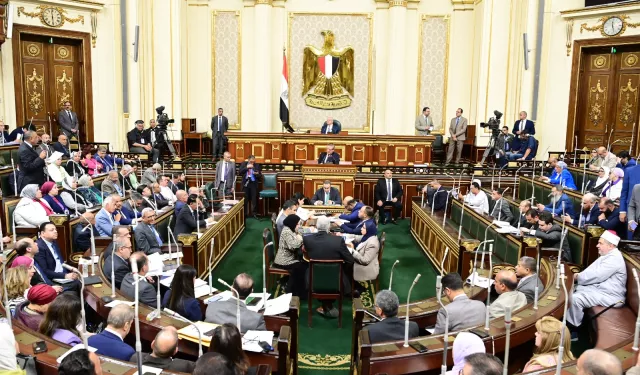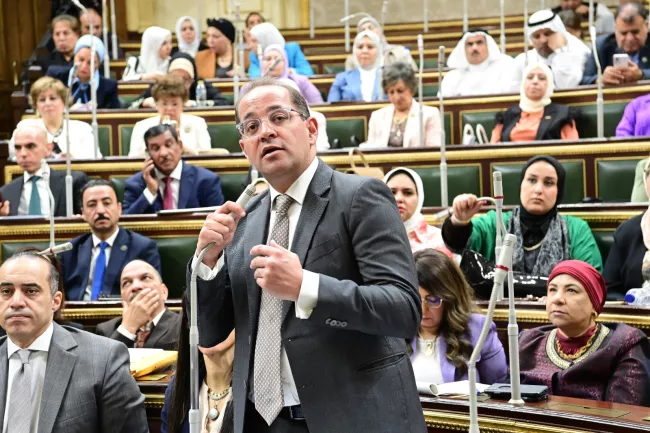
Parliament Diaries| Between war and debt, a national budget of uncertainty
As headlines tracked gold soaring and the dollar swinging under the weight of the Israeli war on Iran—alongside warnings that electricity rationing may soon return to Egypt following a cut in Israeli gas supplies —Parliament turned its attention during its sessions spanning Sunday 15 through Tuesday 17 June, to a new state budget; one that is shaped by uncertainty.
That term—“uncertainty”—first surfaced in official discourse around Egypt’s budget and development plan in the 2020/2021 fiscal year, just months after the COVID-19 pandemic began. At the time, Planning Minister Hala El-Said said, “The 2020/2021 plan was prepared amid extreme uncertainty facing Egypt and the world.”
Serial uncertainty
Over the past six years, “uncertainty” has remained a recurring theme. Each year, ministers have cited different causes: COVID-19, the war in Ukraine, and the ramifications of the Al-Aqsa Flood on the region. Although the 2025/2026 budget was prepared before Israel launched its assault on Iran, the rhetoric of uncertainty dominated its framing.
In the budget’s first chapter, the government dwells on the persistence of extraordinary conditions: “Elevated risk levels, investor uncertainty, and the deepening geopolitical crisis due to the ongoing war in Gaza, which has disrupted Red Sea trade and sharply reduced Suez Canal revenues.”
By the time Parliament opened its budget debate—two days after Israel attacked Iran—Planning, Economic Development, and International Cooperation Minister Rania Al-Mashat again invoked this sense of uncertainty during Tuesday’s general session, which culminated in the final approval of the budget and development plan.
Why approve it?
MPs have grown accustomed to biting the bullet and rubber-stamping budgets constrained by the weight of debt servicing. The majority bloc and its allies routinely find new justifications to push budgets through. While they regularly voice criticisms of the government’s financial and economic management, their objections ultimately dissolve into votes of approval.
This time, the war Israel launched on Iran, on Sunday, June 15, was the new pretext touted by MPs to pass a budget that the opposition had flagged for its debt burden, weak revenues, and poor fiscal management.
On Monday the general session opened with a speech from Majority Leader Abdel Hadi El-Qasabi of the Nation’s Future Party, who declared, “Let the whole world hear this: The Egyptian people, who believe in peace and strive for comprehensive and sustainable development, are the same people who grow stronger in the face of crises, who stand with the Palestinian people in all their just and legitimate rights, and who will never allow their national sovereignty to be compromised, no matter the cost. They are armed with faith, national consciousness, and conscience.”
He stressed the people’s unwavering trust in the president, adding, “History has shown the world that pressure only makes Egyptians stronger, forging lions to defend this nation across all fields.”
El-Qasabi’s speech was not the only impassioned call for unity. MP Mostafa Bakry followed with a message of “hope,” invoking the German people. “They realized that sowing hope is more important than sowing wheat. So they united and prospered,” he said.
The war’s shadow also extended to MP Amr Darwish of the Coordination Committee of Party's Youth Leaders and Politicians/CPYP, who stated, “Now is not the time to reject the budget.” He argued that citizens care less about the budget’s technical details than “being reassured about the country’s direction and the finance minister’s efforts to balance competing pressures.” He concluded, “We say to the public: We are still standing on our feet.”
Taking a harsher tone, MP Suleiman Wahdan, parliamentary affairs secretary of the National Front Party, closed his remarks with a stark warning: “Anyone who wavers now is no better than a traitor.”
Wahdan left his threat undefined. Was he implying that rejecting the budget equals betrayal? Were his dissenting colleagues traitors?
A lone voice
Only one MP Mohamed Badrawy broke the majority’s ranks. Given the two-minute limit per speaker, Badrawy did not get to officially declare his acceptance or rejection. But in a brief conversation afterwards, he clarified “There is no way I can support a budget with these numbers.”
Badrawy criticized Egypt’s over-reliance on taxes (85% of budget revenues) and its poor earnings from key sectors like industry, agriculture, and tourism. He also pointed to the vicious cycle of debt, saying, “For every pound in revenue, 80 piastres go to debt interest. What remains barely covers wages, forcing us to borrow again to build schools, hospitals, and roads. That leads to another deficit.”
Badrawy represents the Al-Santa district in Gharbiya governorate. First elected in 2015 on a Patriotic Movement Party ticket, he made a mark during his first term by submitting an interpellation calling for a no-confidence vote against then–Prime Minister Sherif Ismail over the dire state of the economy.
In the 2020 election, Badrawy ran with the Nation’s Future Party after resigning from the Patriotic Movement.
Rejected because of the war
The specter of war wasn’t confined to the arguments of supporters; it also permeated the rhetoric of those against the proposed general budget. Leading the charge among the objectors was MP Ayman Abu El-Ela, head of the Reform and Development Party’s parliamentary bloc, who addressed the war’s repercussions in his address. He argued, “If I were the government, I would have maintained the previous budget and waited to conduct a genuine assessment once the magnitude of challenges posed by the Israel-Iran war on the entire region, and Egypt, becomes apparent.”
He warned of potential oil price hikes, with Brent Crude nearing $80 a barrel and possibly climbing to $100, forcing Egypt to recalculate its budget assumptions for oil and other key imports like wheat and sugar.
MP Abdel Moneim Imam, secretary of the Budget and Planning Committee similarly rejected the budget “You’re calling for a war government, but this government is not up to the task.” He pointed to ballooning debt, unsustainable interest payments, and a lack of economic competence.
The constitutional trap
MP Fakhry El-Fiky, chair of the Budget and Planning Committee, emphasized the government’s compliance with constitutional spending mandates for health, pre-university education, higher education, and scientific research.
Presenting the committee’s report on Sunday, El-Fiky said, “For the second year running, the government has met these constitutional thresholds through both direct and indirect spending,” and outlined each sector’s share of GDP.
According to him, spending on pre-university education is about 685 bn pounds (4% of GDP), higher education 358 bn (2.1%), health 618 bn (3.6%), and research 173 bn—all slightly above the minimum thresholds. Egypt’s projected GDP is around 20.4 trillion pounds ($400 bn).
In response, MP Amira El-Adly of the CPYP highlighted the discrepancy between how the government calculates spending and how the Budget Committee reports it. She noted that the government bases its calculations on gross domestic product/GDP, while the constitution refers to gross national product/GNP, which is usually higher than GDP.
GDP calculates the value of all goods and services produced within a country’s geographical boundaries, whereas GNP measures the value of goods and services produced by a country’s citizens, regardless of whether they are located inside or outside Egypt.
Parliamentary Affairs Minister Mahmoud Fawzy defended counting indirect spending towards the constitutional targets, citing health-related environmental investments like clean water and air. “What good is it if I hit the health target but ignore clean water? Water affects health too,” he said. “Spending is spending, direct or not.”
Human rights groups have previously criticized the government for inflating social spending figures through such indirect accounting, which can give the misleading impression of constitutional compliance.
The budget passed on Tuesday. But its ramifications will linger amid Egypt’s complex local, regional, and global landscape. This marks yet another entry in the country’s long line of “uncertainty budgets.”
In an era of mounting regional instability, deepening debt, and dwindling revenues, the question remains: When will Egypt find its footing—or at least a measure of certainty?

